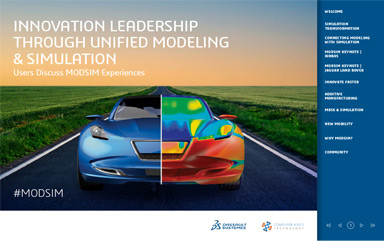ESTECO Releases Spring 2019 Update to VOLTA Simulation Process Automation Suite
New AI algorithms and charting templates extend the ability to bring simulation data into design optimization.
Latest in Design Exploration and Optimization
Latest Resources

Latest Resources

Design Exploration and Optimization Resources

Latest News
March 13, 2019
Engineering simulation data management specialist ESTECO has updated its VOLTA suite of simulation process automation tools with a Spring 2019 update that offers new AI algorithms for machine learning, new template charts for process pre-configuration, and an updated user interface.

This update “expands usability to a different level” with advanced data intelligence, says ESTECO in an update announcement. The Trieste, Italy, software company is a spin-out from a European aerospace research consortium that now specializes in design optimization and simulation data reuse. VOLTA also includes ESTECO’s original simulation process management software, modeFRONTIER.
Optimization-Driven Design
This update focuses on two key themes: the first is optimization-driven design. ESTECO says its new state-of-the-art AI algorithm pilOPT can help engineering teams create autonomous optimization routines. These routines run in the background during engineering simulation sessions, and report out when it locates simulation results that impact optimal design.
VOLTA uses a statistical research technique called Response Surface Modeling, which it implements as an AI algorithm for machine learning training. ESTECO says an updated RSM interface makes it easier to monitor progress, implement best practices for predictive models training and reduce redundancies in fine-tuning the machine learning training configuration.

Two more AI algorithms ship with the VOLTA Spring 2019 update, AutoML and Distributed Random Forest (DRF). Also used in other AI applications, these two algorithms automate machine learning workflow and add new regression techniques, respectively. AutoML allows user-specified time-limit procedures; DRF has a reputation in AI circles for working well with a mix of continuous and categorical data inputs.
Engineering Data Intelligence
The second major theme of the Spring 2019 update is engineering data intelligence. The VOLTA Advisor is a set of templates that offer specific shortcuts to working with large blocks of simulation engineering data. The six templates are:
- Comparison Tablefor visualizing and comparing designs side-by-side;
- Performance History Chartto monitor values of a variable across multiple design alternatives;
- Scatter Matrix Chartto visualize associations between variable pairs;
- Broken Constraint Chartto identify constraints that are causing designs to become unfeasible;
- Probability Function Chartto visualize how variable values are distributed across the complete variable domain;
- Correlation Matrix Chartto mine correlation coefficients between multiple variables.

Also new in the VOLTA modeFRONTIER interface is Sessions, a tool to define Design of Experiment strategies. A particular Session is the match of a Design Exploration strategy and a Workflow domain. ESTECO says the goal of using Sessions is to create an efficient statistical analysis of design space alternatives.
For more information about the Spring 2019 Update of ESTECO VOLTA, click here.
You can find a video on the new RSM tools in VOLTA here.
Check out DE's Computer-Aided Optimization Webcast, which puts ESTECO's Matteo Nicolich in the Hot Seat to answer our questions.
See why DE's Editors selected the Spring 2019 Update of ESTECO VOLTA as their Pick of the Week.
Sources: Press materials received from the company and additional information gleaned from the company's website.
Subscribe to our FREE magazine, FREE email newsletters or both!
Latest News
About the Author
DE’s editors contribute news and new product announcements to Digital Engineering.
Press releases may be sent to them via DE-Editors@digitaleng.news.




